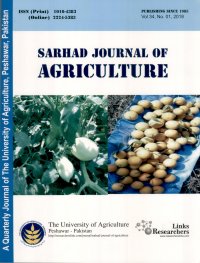Impact of Soil Conditioning and Irrigation Regimes on the Performance of Maize Crop
Impact of Soil Conditioning and Irrigation Regimes on the Performance of Maize Crop
Muhammad Ijaz Khan* and Amanullah Jan
ABSTRACT
In order to improve the physical conditions of soil and provide favorable environment for the growth and development of crops, soil conditioners are used. This study was carried out to evaluate the impact of soil conditioning and irrigation regimes on the performance of maize crop during 2011 and 2012. Four irrigation regimes ranging from 3-6 irrigation in relation to the critical stages of maize crop were applied. Irrigation consisted of 93 mm water. Three organic soil conditioners viz., farmyard manure (10000 kg ha-1), wheat straw as crop residue (10000 kg ha-1) and two levels of humic acid (2 and 4 kg ha-1), alone and in combinations with gypsum (1000 kg ha-1) as inorganic soil conditioner were applied a week before sowing of maize. Design used was randomized complete block with split plot arrangement replicated thrice. Experimental site was Agronomy Research Farm, The University of Agriculture Peshawar. Irrigations regimes were subjected to main plots while soil conditioners to subplots. Results of the two years study indicated that most of the yield and soil parameters were affected by irrigation regimes significantly. Higher crop growth rate, leaf area plant, plant height, biological yield (above ground parts of the plant), grain and straw N contents were found in five times irrigated plots as compared with lower irrigation regime. Results showed that growth characteristics and quality of maize were significantly affected by soil conditioners (SC). Farmyard manure incorporation produced significantly higher crop growth rate, leaf area plant-1, taller plant, higher biological yield, grain and straw N contents of maize crop as compared to other soil conditioners and control treatments. Data on the effect of gypsum application as sole or in combination with the other SC revealed that addition of gypsum had significantly increased all parameters as compared with no gypsum application. It is concluded that farmyard manure (10000 kg ha-1) and gypsum (1000 kg ha-1) with five irrigations at the known critical stages (at emergence, 4 leaves, 8 leaves and tassel visible and blister) performed better as compared with other treatments applied for obtaining good return from maize crop in Khyber Pakhtunkhwa, Province, Pakistan.
To share on other social networks, click on any share button. What are these?







